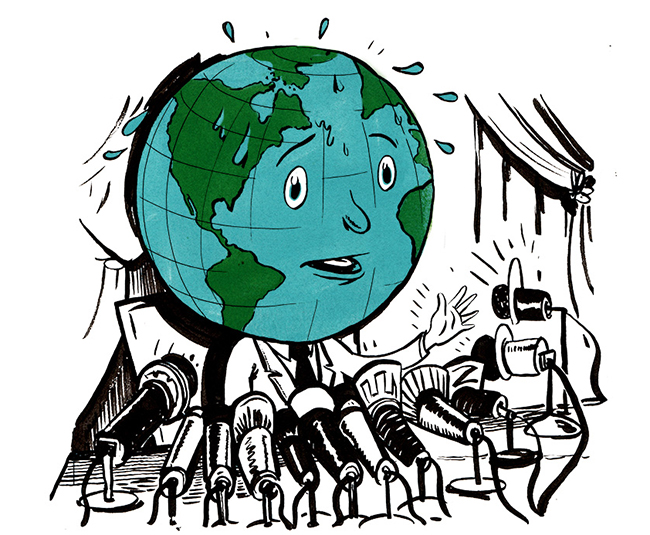ZEITGUIDE TO A WARMING EARTH DAY

The Zeitguide Interview
Earth scientist Peter Kalmus
With Earth Day and the March for Science on April 22nd, we decided to talk with Earth scientist Peter Kalmus, who uses satellite and ground-based data to study stratocumulus clouds over the ocean to better understand how they will change as the planet warms, among other things. Kalmus works at the Jet Propulsion Laboratory / Caltech and is the author of a forthcoming book, “Being the Change: How to Live Well and Spark a Climate Revolution.” His book explains the cold, hard facts of global warming and describes how he personally changed his life in response to that knowledge. He now consumes about 10% of the fossil fuel that the average American does. His comments here are his own, and not on behalf of NASA, JPL or Caltech.
When you decided to stop burning fossil fuels as much as possible in 2010, you took a detailed measurement of your own fossil fuel use. What sort of insight did that give you?
It doesn’t make a lot of sense to talk about “going green” without understanding how the things you do in your daily life translate into CO2 emissions. The biggest surprise I found was that three-fourths of my own emissions came from flying in planes—mainly to attend scientific conferences. So whatever else I changed to reduce my emissions would be meaningless unless I stopped flying. Over the next two years, I ramped down my flying to zero, which took revising expectations held by my family, my parents, my scientific colleagues and myself—but there wasn’t really a lot of resistance. I think most people realize at some level that we do need to stop burning fossil fuels, even if they’re not ready to do it themselves.
I’ve met many keen environmentalists who fly a lot … I even once read a blog from an environmentalist urging people to bring their own water bottle on flights, in order to reject the disposable water bottles they bring you. Well, how many bottles would it take to equal the emissions from the flight?
You also became a vegetarian and started growing some of your own food. How did that impact your fossil fuel use?
Quitting flying reduced my annual emissions by about 16 tonnes of CO2 per year. Becoming vegetarian reduced my emissions by about 1.5 tonnes of CO2e (CO2-equivalents, which includes effects of other greenhouse gasses) per year. This number is still pretty uncertain: A lot of work remains to be done in estimating the climate impacts from our food systems. Getting a lot of my food from the waste stream (supermarket discards) reduced my emissions by about 2 tonnes of CO2e per year. Relative to my 2010 lifestyle, these were the three most effective changes I made. Bicycling more and driving less came in fourth.
You’re not a fan of buying “green” stuff—like electric cars—to reduce energy use. Why is that counterproductive?
I don’t think we can shop our way out of global warming. The biggest problem I see with things like electric cars is that people buy them and then assume they’ve “done their part,” which may actually get in the way of deeper individual change. Electric cars also perpetuate our systems of freeways, suburbs, parking lots and commuting which gets in the way of deeper collective change.
The simple fact is that we need to stop burning fossil fuels—and this means we’re going to have to change our lifestyles a bit. My main message is that changing our lifestyles isn’t something to be afraid of—it’s something to embrace. Our current high-consumption, fast, frazzled lifestyles aren’t exactly making us happy.
What do you think are some deep misperceptions about global warming and where progress is or is not being made?
The biggest misperception is that the science is still open for debate. It’s actually extremely settled: Global warming is real, humans are causing it and it will make life worse for humans. The likelihood that this is wrong is roughly equivalent to the likelihood that the Earth is flat.
Unfortunately, human minds are swayed not so much by facts and evidence as by irrational emotions, desires and preconceptions. I urge scientists who feel concerned by the changes they’re observing to speak out in a way the public understands. It’s time for scientists to embrace their emotions and connect with the public. We need to cut the dry language and tell the story to let the public know why they should care.
Finally, what makes you optimistic that humans can change their behavior quickly and dramatically?
My main cause for optimism is the possibility that the U.S. will adopt a revenue-neutral carbon fee and dividend. This could cause a rapid shift away from fossil fuels if done correctly. It would also cause other countries to rapidly follow suit. And it wouldn’t hurt our economy (it would actually help), it wouldn’t create new regulations (we could even safely relax some) and it wouldn’t increase the size of government. So it’s something that I hope both political parties could be happy with.
If that fails to happen, the planet is going to keep getting warmer; the laws of physics are relentless that way. The impacts will become increasingly obvious and undeniable. And if we let things go even further, I think civilization will break down to the extent that we no longer have the technological capability to burn fossil fuels on the scale we do today. One way or another, we’ll change.
